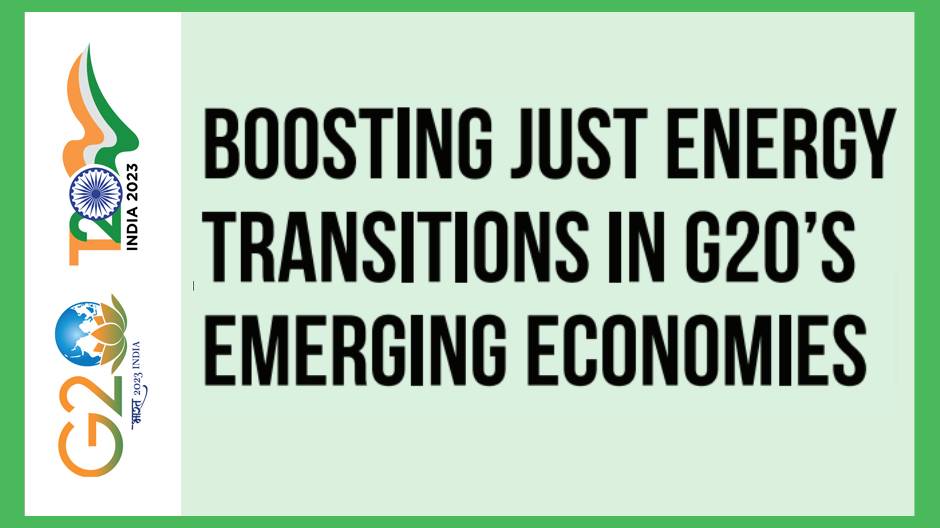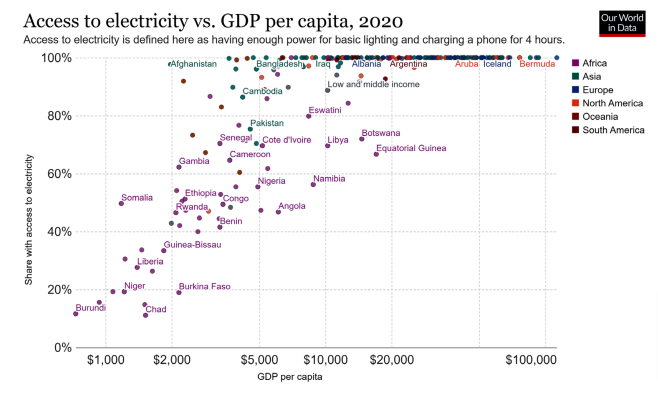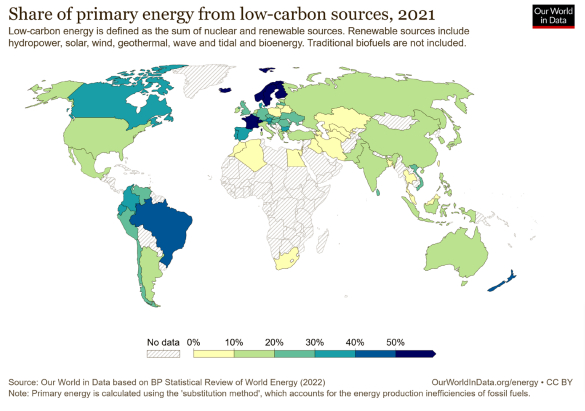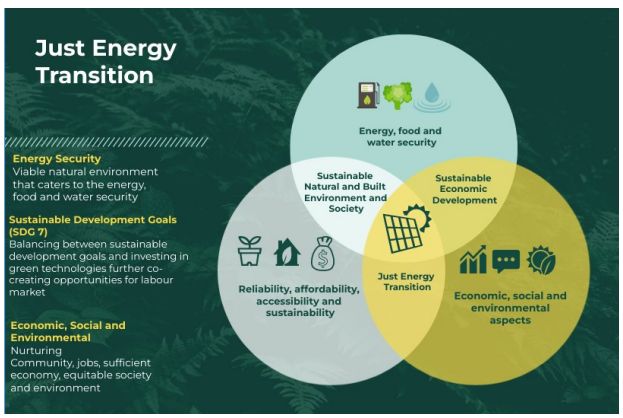Abstract
The true essence of attaining just transitions and sustainable development is by maintaining the balance between environmental protection and human economic development to ensure that no one is left behind. The benefits of the just transition have to reach beyond the educated and the privileged class, which is an enormous task. This policy brief argues that the emerging economies in the G20 need strategic alliances and partnerships with and investments from the G7 countries (and vice versa) to decarbonise their economies by taking into account the climate emergency.[a] These collaborative efforts will result in enhanced investments and commitment that will lead to immense opportunities for social and economic development and the creation of sustainable jobs in the ecological sectors and beyond. This policy brief presents practical strategies for achieving a just transition framework for social inclusion, integration, and cohesion.
- The Challenge
There is an ongoing global transition from fossil fuel-based energy production and consumption systems to renewable sources to mitigate the catastrophic effects of climate change. Moving ahead, today the emerging economies of the G20 and the G7 countries face three main problems. The challenges for just energy transition are not limited to only emerging economies of G20 but for G7 nations as well. The literature for just energy transition suggests that issues related with the same should not be studied in isolation or with specific group but as a world subject/concern. First, economies that have low carbon emissions lack access to energy. This can be seen in poor settlements in several G20 countries, such as India, Indonesia, and Brazil (the G20 Troika—the current, past, and incoming presidencies). The lack of access to modern energy sources results in using traditional fuels for lighting, heating, and cooking, causing serious health and environmental problems. The lack of access to energy also keeps families in poverty as it impacts the socioeconomic well-being of individuals and families. Secondly, economies with high access to energy contribute significantly to greenhouse gas (GHG) emissions. For instance, over 99 percent of households in countries like Germany, Ireland, and Greece have per capita emissions of over 2.4 tonnes per year (Ivanova and Wood, 2020). Both living standards and carbon emissions are high in developed countries, which are not sustainable over the long run. Figure 1 shows that large shares of people in economies with a per capita GDP of less than US$25,000 do not have access to electricity and clean fuel.
Figure 1: Electricity access vs. GDP per capita of World Economies (2020)
Source: Our World in Data, 2020-2022
The third challenge—the adoption of modern technologies (essentially, adopting technologies to transition from traditional to modern energy sources in a just manner)—arises from the first two. Most developed countries first began to use modern technologies in the early 2000s, while developing countries only started doing so by 2010. Most historical energy transitions were focused on and driven by the exploitation of a new energy resource, with limited deliberation on social or environmental consequences. These transitions followed a top-down approach, and the highly centralised energy systems were controlled by a limited number of corporate actors (Devezas and Matias 2007, 763-770). On the other hand, the current transition, in theory at least, involves numerous cross-sectorial stakeholders that are more informed by public policy and are more likely to include those social groupings that are directly affected (Lennon, Dunphy, & Sanvicente 2019, 1-18) and (Dutta and Das 2020, 1-15). This is the essence of a just energy transition.
Still, the use reneweable energy sources is more rampant in developed nations (such as the US and those in the European Union) rather than the developing economies (such as those in Africa and the Asia-Pacific). As such, the transition to clean energy is not inclusive and just as it does not include a people-centric approach, and is only aimed at achieving international targets to combat climate change. These quantitative targets often tend to be deceptive and fail to consider the well-being of the affected people, particularly in developing countries and from marginalised groups. The transition to renewables will reduce GHG emissions and create green jobs, but will also lead to displacement and a loss of jobs for those engaged in the traditional energy industries (such as coal workers), which is detrimental to ‘social justice’ (in terms of the distribution of wealth, opportunities, and privileges within a society). Therefore, developing countries will need more financial, technological, and reskilling support for the significantly large labour market engaged in fossil-fuel-intensive industries. The use of clean energy resources by underprivileged and vulnerable communities depends on the accessibility, affordability, and reliability criteria.
Figure 2 depicts the percentage share of primary consumption of non-conventional energy sources around the world. In 2021, 16 percent of the world’s primary energy came from low-carbon sources (nuclear and renewables).
Figure 2: Primary share of energy consumption from renewable and nuclear energy of World Economies.
Source: Our World in Data, 2021-2022
Specifically, in the case of India, the electricity trade with its neighbours is largely one-sided. The country annually imports around 1,200 mega watt (MW) of power from Bhutan, which is expected to grow significantly, and exports 1,200 MW to Bangladesh, 450 MW to Nepal, and 3 MW to Myanmar. Cross-border energy trade will not only provide an incentive for India to increase return on investments through trade but will simultaneously present an opportunity for neighboring countries to gain access to a large power system with diverse energy resources. Countries like India, Indonesia, Vietnam, and South Africa will require growth in energy demand and an appropriate mix of sources of energy for just energy transition. Therefore, the G7 nations and the G20’s emerging economies should look beyond the phasing out of coal to reduce emissions, such as by prioritising the health sector (specifically after COVID-19 and the use of wood and waste for cooking), reduction of poverty (loss of incomes and jobs during COVID-19 and with transition towards new industries), and simultaneously economic growth, which aligns itself to other Sustainable Development Goals (SDGs).
- The G20’s Role
World Health Organization data (December 2022) reveals that Thailand, Indonesia, India, Vietnam, Egypt, South Korea, Brazil, Turkey, and Japan are at most risk from climate change and can face extreme health risks due to air pollution. Besides, health issues, land grabbing for establishing coal plants and low wages, and lack of safety standards have resulted in many conflicts. Their dependence on coal and other fossil fuels for electricity generation is responsible for large CO2 emissions (International Energy Agency, 2022). The emerging economies of G20 must support the just energy transition through partnership, raising finances, improving access to the marginalised groups, and cohesively working towards carbon neutrality. Additionally, the financial regulators and central banks have a major role to play in catalysing these developments and encouraging banks to finance the transition from coal to renewable energy, provided individual governments take strict actions and measures to shift from fossil fuels to renewable energy in a manner that safeguards the environment and respects human rights. Furthermore, due to the intricacy of the energy transition process, different regions of the world go through different trajectories depending on their local energy consumption patterns, geographic locations, and economic links to fossil fuels.
- Recommendations to the G20
An energy transition policy that ensures the benefits and cost of energy transition are shared fairly among different communities, regions, and countries will be just. Just energy transitions aim to guarantee the right to live in a safe and healthy environment and access to energy and jobs regardless of socio-economic status, race, or ethnicity. The shift to sustainable and renewable energy may disproportionately affect various marginalised groups and vulnerable individuals in developing nations, which includes Indigenous communities, rural communities, and low-income households. These marginalised populations primarily rely on natural resources for livelihood, which is sensitive to climate change and have limited ability to adapt to changing climatic conditions (World Bank, 2020). Against this backdrop, this brief presents certain recommendations to support just energy transitions in the G20 nations. A just clean energy transition and energy justice can help reduce farm household dependency on fossil fuel and contribute, among others, to achieving SDG-2 (zero hunger), SGD-7 (access to affordable, reliable, sustainable, and modern energy for all), SDG-10 (reduced inequality), SDG-12 (responsible consumption and production), and SDG-13 (to limit and adapt to climate change). It is crucial for the G20 to boost investment in just energy transition in the grouping’s emerging countries and beyond to contribute to sustainable food security.
Figure 3: Levels of Just Energy Transition
Source: Authors’ Own
- Energy Security: Energy security has been a major challenge for both developed and developing economies even before the Russia-Ukraine conflict but became more apparent after the invasion. For instance, Europe experienced an energy crisis last winter (2022), which resulted in skyrocketing electricity prices and bankruptcy of the utilities as it struggled to manage not just early Russian gas supply cuts but also more unreliable electricity sources and fewer buffers to withstand unforeseen shocks. Therefore, G20 nations should invest in developing new renewable energy sources for reliable electricity generation, which requires partnership, investment in technology, and diversification of energy sources in terms of types and countries of import. Furthermore, the G20 countries should support other developing nations through blended finance and technology transfers to enable and foster a just energy transition and a sustainable global future.
- Water Security: The shift to net-zero emissions energy affects water usage and increases water demand. Hydrogen, renewable fuels, batteries, pumped storage hydropower, nuclear, and carbon capture have specific water requirements, which could increase pressure on already scarce water resources. Therefore, global communities must be accountable for obtaining, utilising, and treating water. Further, water resources have competing demands from agriculture, industries, and household consumption, which have the potential to induce conflicts if not properly managed. The G20 should contribute to the management of water resources in G20 emerging countries and other developing countries in the Global South through proper guidelines, governance, and investment in water-saving technology.
- Food Security: Food security is dependent on energy transition and land-use change. Climate change, increasing unpredictability in rainfall, prolonged droughts, and unexpected heavy floods have all posed serious threats to the energy transition, sustainable livelihoods, and food security for the global population. Therefore, green energy is critical for food security, just energy transition, and global food production that relies on fossil fuels.
- Social Justice and Society: Energy transition processes must explore and resolves issues of justice. This can be linked to the equitable distribution of energy infrastructure and the provision of equitable access to marginalised sections. Access to improved and sustainable energy services is critical to achieving better health, poverty reduction, socio-economic development, and improved livelihood, particularly for women and girls who have traditionally shouldered household responsibilities while being denied access to social and economic activities. Therefore, the just energy transition necessitates the identification of various groups impacted by the energy transition policies and ensuring they benefit from such processes through targeted programmes or projects.
- Technology: Investing in new and allied technologies and building small and effective policies around them can help the world economies have more efficient solutions such as modular reactors, green hydrogen, geothermal, carbon capture storage, and new eco-innovations. It is also necessary to align each nation’s manufacturing capabilities with such technologies. Therefore, the G20 has a crucial role in investing in promoting renewable energy and allied technologies and supporting their scaling at the national, regional, and global levels. The promotion of a circular carbon economy could see the need for technologies to remove and store CO2. These technologies range from carbon capture and use/storage to negative emissions technologies (such as bioenergy with carbon capture and storage and direct air capture and carbon storage), as well as natural climate solutions such as reforestation and afforestation.
- Skills and Development: As the energy transition will lead to a loss of jobs, reskilling the workforce is a key cog in the just energy transition. It requires expanded education, labour training, and targeted skill programmes for labourers, women, and people from indigenous communities to expand the job market (beyond the educated and privileged classes). At the same time, a people-centric just energy transition will also require some aspirational and high-quality jobs. Further, support from international organisations and companies can help build the sentiments for just energy transition and achieve the country’s goals through sustainable financing in new energy to manage risks and build infrastructure.
Attribution: Aaina Dutta, Dil. B. Rahut, and Sukanya Das, “Boosting Just Energy Transitions in G20’s Emerging Economies,” T20 Policy Brief, July 2023.
Bibliography:
Aaina Dutta and Sukanya Das, “Adoption of grid-connected solar rooftop systems in the state of Jammu and Kashmir: A stakeholder analysis”, Energy Policy, (2020): 1-15.
BP Statistical Review of World Energy, “BP Statistical Review-71st Edition. Analytical”, British Petroleum, (2022): 1-51.
Breffní Lennon, Niall Dunphy and Estibaliz Sanvicente, “Community acceptability and the energy transition: a citizens’ perspective”, Energy Sustainability and Society, (2019): 1-18.
Diana Ivanova and Richard Wood, The unequal distribution of household carbon footprints in Europe and its link to sustainability”, Global Sustainability, (2020):1-12.
Matias Oliveira , João Carlos and Tessaleno Campos Devezas, “Consumption dynamics of primary-energy sources: The century of alternative energies”, Applied Energy, (2007): 763-770.
Our World in Data, “Electricity access vs. GDP per capita of world economies”, (2020), https://ourworldindata.org/energy-access
[a] Primarily, “to hold the global temperature increase well below 2 degrees Celsius and to pursue the efforts to limit it to 1.5 degree Celsius above pre-industrial levels,” as per the Paris Agreement.








